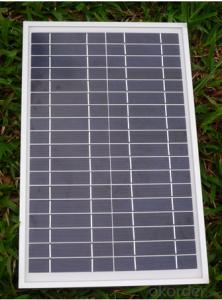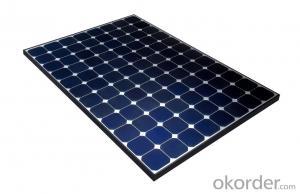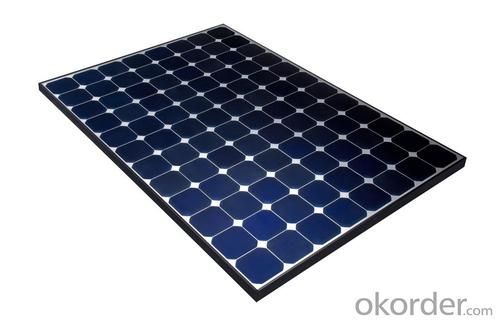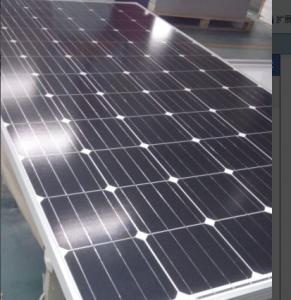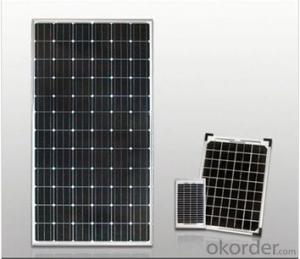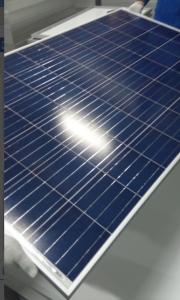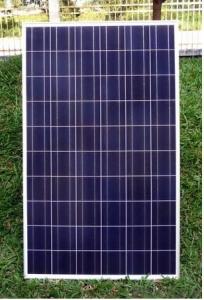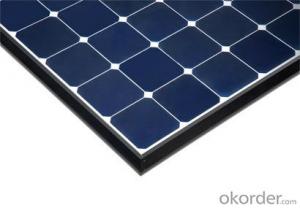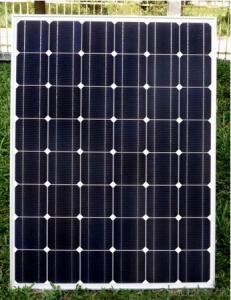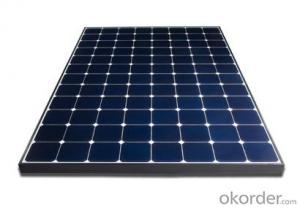Project Solar Panels:Mono Solar Panel 295W A Grade with Cheapest Price
- Loading Port:
- Shanghai
- Payment Terms:
- TT OR LC
- Min Order Qty:
- 50 watt
- Supply Capability:
- 50000 watt/month
OKorder Service Pledge
OKorder Financial Service
You Might Also Like
Specification
Mono Solar Panel 295W A Grade with Cheapest Price
Product description
60 cell multi-crystalline solar module. 40mm natural anodised frame. IP65 rated Jbox, 1m solar cable and a pair of MC4 connectors.TÜV SÜD,SABS ISO 9001:2008 certified.
third generation solar technologies use advanced thin-film cells. They produce a relatively high-efficiency conversion for the low cost compared to other solar technologies. Also, high-cost, high-efficiency, and close-packed rectangular multi-junction (MJ) cells are preferably used in solar panels on spacecraft, as they offer the highest ratio of generated power per kilogram lifted into space. MJ-cells are compound semiconductors and made of gallium arsenide (GaAs) and other semiconductor materials. Another emerging PV technology using MJ-cells is concentrator photovoltaics (CPV)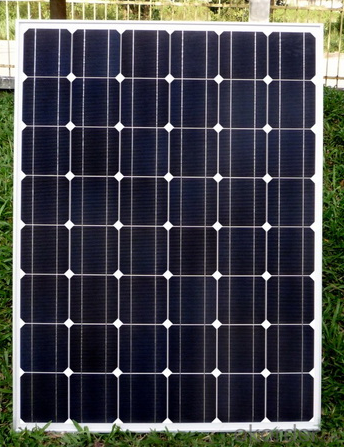
Application
Industrial
Commercial
Residential
Product feather
solar panel refers to a panel designed to absorb the sun's rays as a source of energy for generating electricity or heating.
A photovoltaic (in short PV) module is a packaged, connected assembly of typically 6×10 solar cells. Solar Photovoltaic panels constitute the solar array of a photovoltaic system that generates and supplies solar electricityin commercial and residential applications. Each module is rated by its DC output power under standard test conditions, and typically ranges from 100 to 365 watts. The efficiency of a module determines the area of a module given the same rated output – an 8% efficient 230 watt module will have twice the area of a 16% efficient 230 watt module. There are a few solar panels available that are exceeding 19% efficiency. A single solar module can produce only a limited amount of power; most installations contain multiple modules. A photovoltaic system typically includes a panel or an array of solar modules, a solar inverter, and sometimes a battery and/or solar tracker and interconnection wiring.
Packaging
24-26pcs into carton 312pcs for 20 foot container 712pcs for 40 foot container.
- Q: Can solar panels be used for powering electric lawnmowers or gardening tools?
- Yes, solar panels can be used to power electric lawnmowers or gardening tools. By connecting the solar panels to a battery or an inverter system, the energy generated from the sun can be stored and used to power these tools. This provides a sustainable and eco-friendly option for maintaining lawns and gardens.
- Q: How do solar panels affect home resale value?
- Solar panels can have a positive impact on home resale value. Studies have shown that homes equipped with solar panels tend to sell faster and at a higher price compared to similar homes without solar panels. This is because solar panels offer potential buyers the benefit of reduced energy costs and a more sustainable lifestyle. Additionally, as renewable energy becomes increasingly important, having solar panels can make a property more attractive and desirable in the real estate market.
- Q: Can solar panels be used in remote areas?
- Yes, solar panels can be used in remote areas. Solar panels can harness energy from the sun to generate electricity, making them a suitable and sustainable option in areas where access to grid electricity is limited or nonexistent. Their ability to operate independently of traditional power sources makes solar panels a practical choice in remote locations, providing clean and reliable energy for various applications.
- Q: What are the benefits of using solar panels?
- There are several benefits of using solar panels. Firstly, they provide a clean and renewable source of energy, reducing the dependence on fossil fuels and decreasing carbon emissions. Solar panels also help to lower electricity bills by generating free electricity from sunlight. Additionally, they require very little maintenance and have a long lifespan, making them a cost-effective investment. Furthermore, solar panels can increase the value of a property and provide energy independence, especially in remote areas or during power outages. Overall, using solar panels promotes sustainability, saves money, and contributes to a greener environment.
- Q: Can solar panels be installed on a rented property?
- Yes, solar panels can be installed on a rented property. However, it is important to consult with the landlord and review the lease agreement to ensure that the installation is allowed. In some cases, the landlord may require written permission or may be responsible for the installation process. Additionally, it is recommended to discuss the potential benefits and cost savings of installing solar panels with the landlord to determine if it is a viable option for both parties.
- Q: I have a panel that quot;deep breatheproduces at 4% efficiency, what can it power, It's about 4ft by 2ft
- Area is 4' * 2' * (0.3048m/ft)^2 = 0.743m^2. Incoming solar (assuming optimally oriented panel) averages about kW/m^2, so 743W max gross. 4% efficiency yields 300W. Most panels are about 0% - 5% efficient, which is about W. In either case, figure about /2 the theoretical efficiency for about 2 hrs per day. so, you can run something from 50 to 50W about 2hrs per day. Too small for any appliance except maybe a laptop or light bulb. Panels typically make about 2V, not enough to run household stuff anyway. Normally panels are used to charge batteries, then an inverter takes power from the battery to run your appliances. Good luck!
- Q: Can solar panels be installed on a condominium or apartment building?
- Yes, solar panels can be installed on a condominium or apartment building. However, the feasibility and process may vary depending on factors such as building ownership, structural integrity, and local regulations. It is important to consult with professionals and obtain necessary permissions before proceeding with the installation.
- Q: I have thermal solar panels on my roof. Iive in Colorado
- The problem with solar thermal is that it's a lot of plumbing. You should have a professional remove it. If you can't find a suitable solar company, try plumbers at least to disconnect the panels. Of course solar thermal systems are fairly simple devices, you should be able to just repair them.
- Q: I am starting to think about solar panels as an option for my home. I have done some research on panels, to be honest its all very confusing. There are many different panels some with 60 watts some all the way up to 20 watts. My household currently uses about 2700 to 3400 kWh every two months. So based off of my power usage maybe you can answer some of the following questions:What kind of panels should I be looking at?Which panel manufacturers give the best bang for the buck (reliable/affordable)?Anything else I should be concerned about?I am just starting out in educating myself on solar power so please excuse me if I sound very naive. Any information that you may have will be helpful. Thanks in advance.
- I'm not an expert, but I recently went through the process and now have a system on my home. I got 3 quotes from 3 licensed contractors and they all seemed to be about the same, the prices seemed to be based on the amount of energy they produced. In CA and I'm sure everywhere else they are tested by an independent agency which rates the output of the panels. You seem to have similar usage as my house, I got a 3.75kwhdc unit, it isn't expected to eliminate my bill, but it should reduce it by quite a bit. I've only had it for a few months and it took me from about 45 kwh per day to around 0. I know I'll have lower output in the winter, but my usage is lower in the winter as well. I decided on this size unit to maximize my rebates and I can take advantage of my utilities rebates when I add to the system in a few years. The difference between panels seemed to be how big they were. Some systems can be twice the size and produce the same amount of energy. I put a couple links below that I found helpful. The roseville pv buy down program has some great links that give information about specific systems.
- Q: Currently being sold today! I know SunPower corp. commercial panels are about 20%.
- About 20-22 percent is about right for panels affordable by most consumers. Even then, you still only get enough power to light a couple of lights for $400-$500, and only works when the sun is shining.
Send your message to us
Project Solar Panels:Mono Solar Panel 295W A Grade with Cheapest Price
- Loading Port:
- Shanghai
- Payment Terms:
- TT OR LC
- Min Order Qty:
- 50 watt
- Supply Capability:
- 50000 watt/month
OKorder Service Pledge
OKorder Financial Service
Similar products
Hot products
Hot Searches
Related keywords
